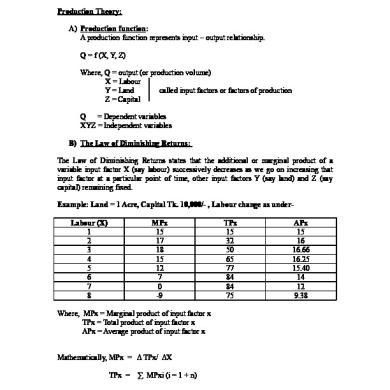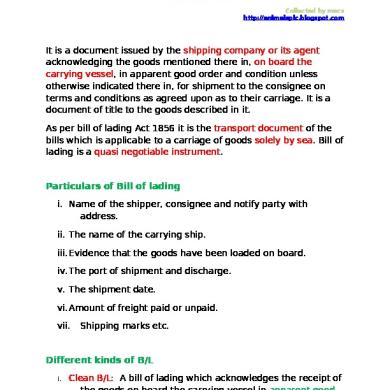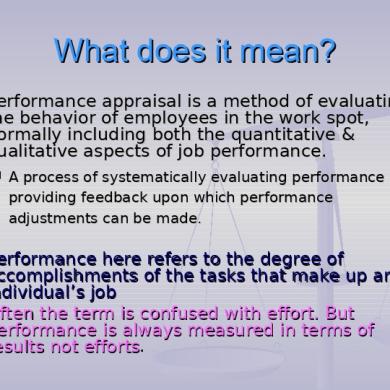Contingent Contracts
This document was uploaded by user and they confirmed that they have the permission to share it. If you are author or own the copyright of this book, please report to us by using this DMCA report form. Report DMCA
Overview
Download & View Contingent Contracts as PDF for free.
More details
- Words: 724
- Pages: 2
Contingent Contracts A contingent contract is a contract or do or not to do something, if some event, collateral to such contract, does or does not happen (Sec 31) Illustrations: A contracts to pay B Rs 10,000 if B’s house is burnt. This is a contingent contact. Meaning of Contingent Contract A contract may be unconditional or absolute on the one hand and conditional or contingent on the other. The absolute or unconditional contract is one without any reservations or conditions and is to be performed under any event. On the other hand, conditional or contingent contract is one in which a promise is conditional and the contract shall be performed only on the happening or not happening of some future uncertain event. The event must be collateral to the contract. The condition may be precedent or subsequent. A collateral event is defined as one which is neither a performance directly promised as part of the contract, nor the whole of the consideration for a promise. The event, therefore independent of the contract and does not form part of consideration to it. The performance of such a contract depends on contingency and such contingency is uncertain. The test of determining whether the contract is contingent or not, is uncertainty. If contingency is certain it is not a contingent contract. Essential characteristics of a Contingent Contract: a) There should be existence of a contingency; happening or non-happening of some event in future. b) Contingency must be uncertain. c) The event must be collateral, for example incidental to the contact. Rules Regarding Contingent Contracts: Enforcements of contracts contingent on happening of a future uncertain event: (Sec32) Contingent contracts to do or not to do anything if an uncertain future event happens cannot be enforced by law unless and until that event has happened. If the event becomes impossible such contracts become void. Illustrations: (a) A makes a contract with B to buy B’s houses if A survives C. This contract cannot be enforced by law unless and until C dies in A’s life time. (b) A makes a contract with B to sell a house to B at a specified price, if C to whom the house has been offered refuses to buy. The contract cannot be enforced by law unless and until C refuses to buy the house. (c) A contracts to pay B a sum of money when B marries C. C dies without being married to B. The contact becomes void.
Contracts so contingent become void when the event becomes impossible. Performance of such contract becomes impossible as the event on which the contract was contingent becomes impossible for example, imposition of government restrictions. Enforcement of contracts on the non-happening of a future uncertain event: (Sec 33)
Contingent contracts to do or not to do anything if an uncertain future event does not happen can be enforced when the happening of the event becomes impossible and not before. Illustration: A agrees to pay B a sum of money if a certain ship does not return. The ship is sunk. The contract can be enforced when the ship sinks. Contracts contingent on future conduct of a living person: (Sec 34) If future event which a contract is contingent is the way in which a person will act at an unspecified time, the event shall be considered to become impossible when such person does anything which renders it impossible that he should so act within any definite time, or otherwise than under future contingencies. Illustration: A agrees to pay B a sum of money if B marries C, C marries D. The marriage of B to C must now be considered impossible although it is possible that D may die and that C may afterwards marry B. Contracts contingent on a specified event happening within a fixed time: (Sec 33(1))
Contingent contracts to do or not to do anything if a specified uncertain event happens within a fixed time become void if, at the expiration of the time fixed, such event has not happened or if before the time fixed, such event becomes impossible. Illustrations: A promises to pay B a sum of money if a certain ship returns within a year. The contracts may be enforced if the ship returns within the year, and becomes void if the ship is burnt within the year.
Contracts so contingent become void when the event becomes impossible. Performance of such contract becomes impossible as the event on which the contract was contingent becomes impossible for example, imposition of government restrictions. Enforcement of contracts on the non-happening of a future uncertain event: (Sec 33)
Contingent contracts to do or not to do anything if an uncertain future event does not happen can be enforced when the happening of the event becomes impossible and not before. Illustration: A agrees to pay B a sum of money if a certain ship does not return. The ship is sunk. The contract can be enforced when the ship sinks. Contracts contingent on future conduct of a living person: (Sec 34) If future event which a contract is contingent is the way in which a person will act at an unspecified time, the event shall be considered to become impossible when such person does anything which renders it impossible that he should so act within any definite time, or otherwise than under future contingencies. Illustration: A agrees to pay B a sum of money if B marries C, C marries D. The marriage of B to C must now be considered impossible although it is possible that D may die and that C may afterwards marry B. Contracts contingent on a specified event happening within a fixed time: (Sec 33(1))
Contingent contracts to do or not to do anything if a specified uncertain event happens within a fixed time become void if, at the expiration of the time fixed, such event has not happened or if before the time fixed, such event becomes impossible. Illustrations: A promises to pay B a sum of money if a certain ship returns within a year. The contracts may be enforced if the ship returns within the year, and becomes void if the ship is burnt within the year.
Related Documents

Contingent Contracts
May 2020 20
Contingent Contracts-7
October 2019 11
Contracts
December 2019 62
Contracts
July 2019 48
Contingent Bill.pdf
April 2020 16
Contingent Valuation
April 2020 19More Documents from "Carlos Ferreira"

Production Theory
May 2020 21
Islami Song
June 2020 20
Bill Of Lading
July 2020 19
Incentives For Exporters
July 2020 27
Managing Marteing Channels
May 2020 0